In this first issue of 2022, the Northeast News staff is looking back on our most impactful stories of 2021. Progress was made despite, or in some ways made necessary by, a pandemic. Northeast neighborhoods embraced change and held tight to their history. New neighbors joined us from across the world, and Kansas City’s urban neighborhoods made strides toward equity and equality.
Thank you for supporting the Northeast News in our mission to provide an independent voice for our historic neighborhoods through our free weekly paper. We’re excited for all the challenges, changes and opportunities ahead in 2022.
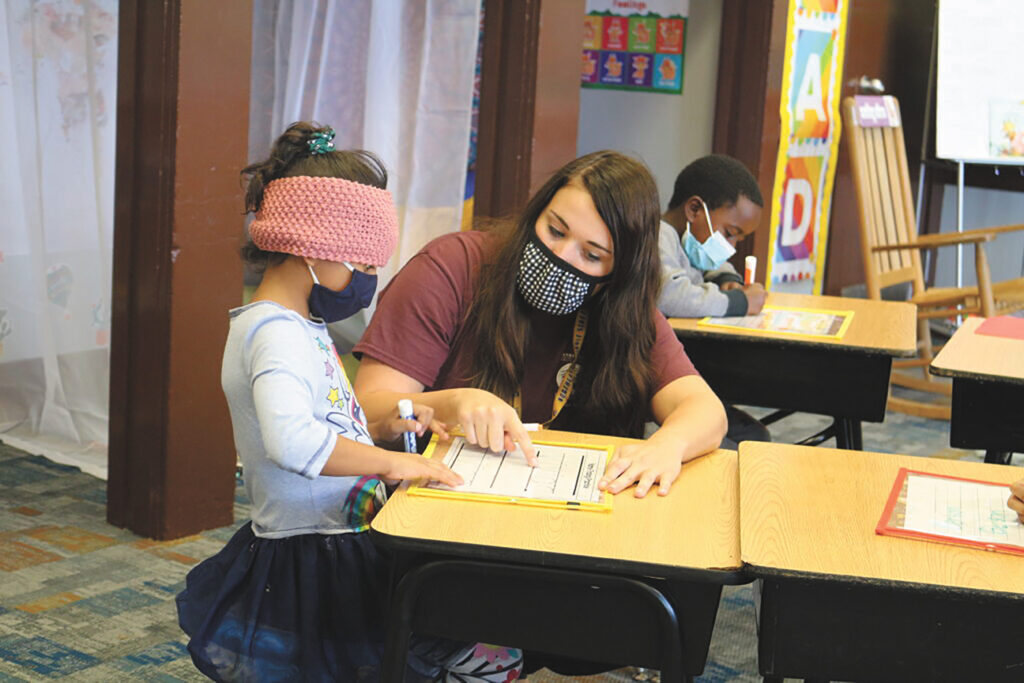
Schools
For Northeast’s Kansas City Public Schools (KCPS) students, the year started with virtual learning, bus stop sack lunches, and handing out wi-fi hotspots. In January, schools reopened for in-person learning, but bolstered options for virtual learning.
In 2021, Kansas City Public School District (KCPS) was rethinking the methods they use to teach immigrants and refugee students. When the district returned to school last fall, English Language Learners (ELL) were welcomed to the new International Welcome Center (IWC) at 711 Woodland Ave. The center also serves as a “one-stop shop” for resources, enrollment, translation and other services for their families. Forty elementary students were greeted by an IWC staff that can translate for nine languages for the first day of classes on September 17. “It’s an invitation, it’s a promise, and it is a 60,000 square foot welcome mat to refugee and immigrant families coming into our city and schools,” said Allyson Hile, Director of Language Services and Cultural Equity for KCPS.
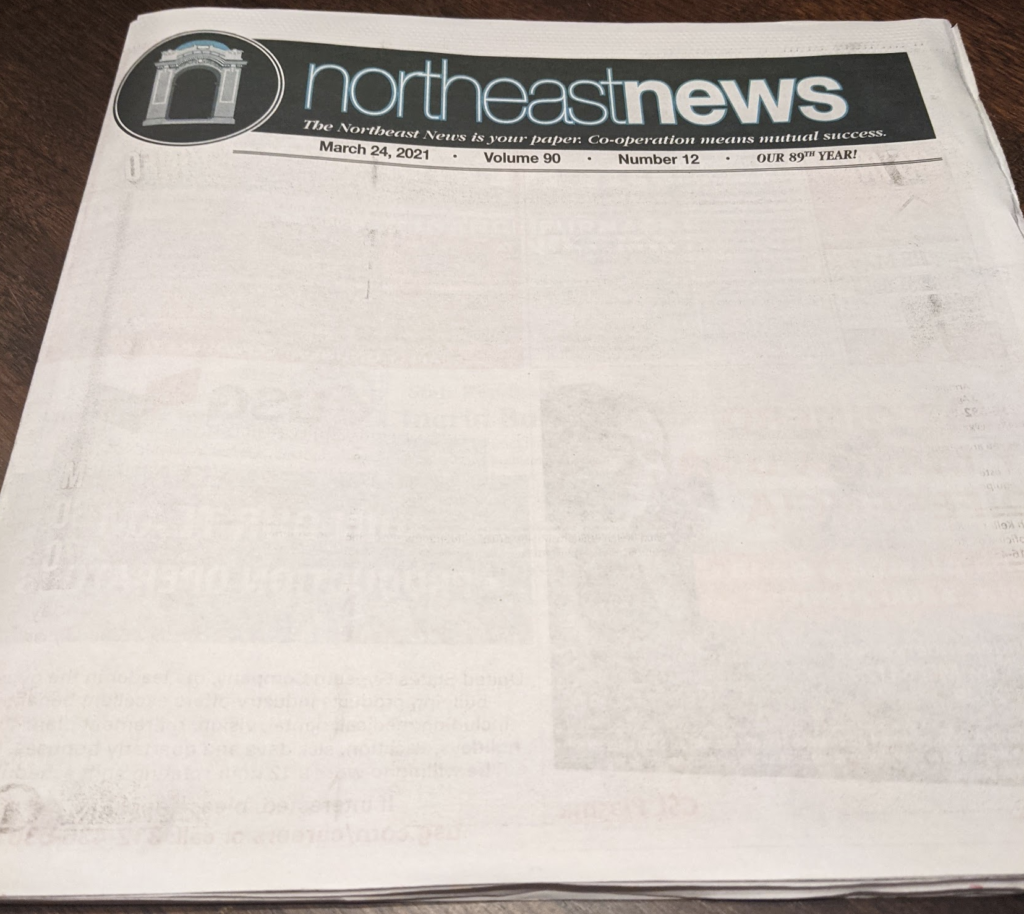
Blank Front Page
On March 24, The Northeast News team published a print edition with a blank front page. No words, no pictures, just the banner with a date. Only three articles were included in that edition: an editorial about the “Wal-Marting of Community News,” “A Story Intertwined” about the Northeast community and its community newspaper, and “You Decide,” asking the community to take responsibility for its future. It was a risky move designed to send a bold message about how a strong community newspaper is directly linked to a strong community.
Initial response to that edition was phenomenal. Local news picked up the story then the big dogs like the Huffington Post, the New York Times and the Associated Press started asking questions for news stories on their news platforms and affiliates. Within three days of that issue breaking, the Northeast News was in news outlets around the world, including one in Sydney, Australia. The donation button on the front page of the Northeast News website began to get noticed as well, garnering an initial $3,000 in donations in about four days.
Mission accomplished? Initially, yes. The donations leveled off to about $100 per month, enough to pay the water bill, but challenges still remain.
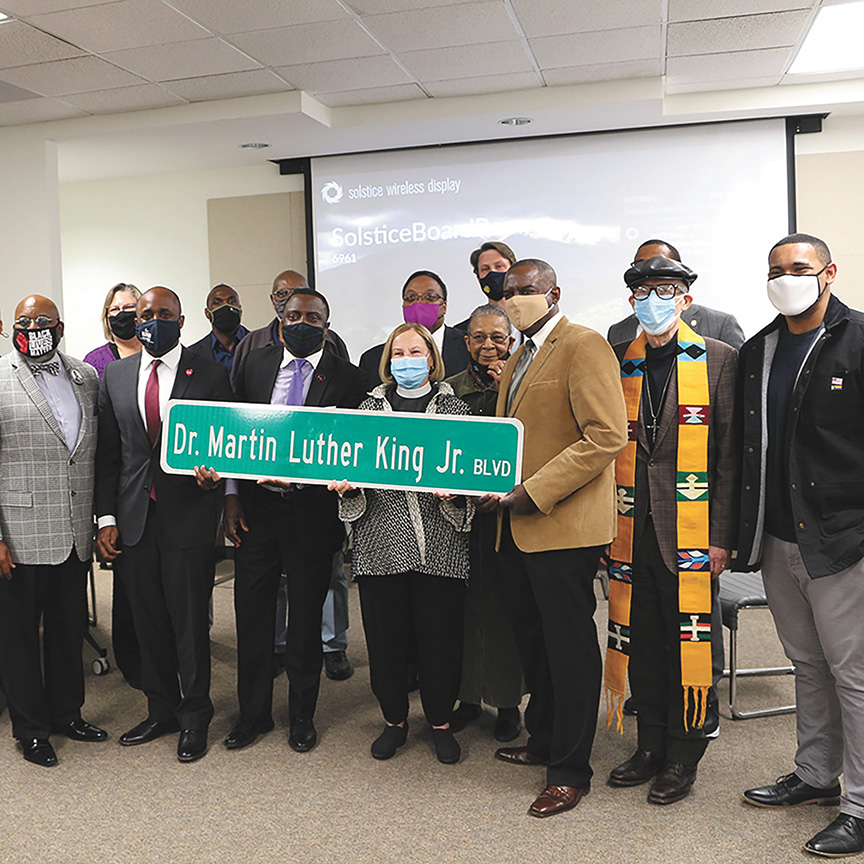
Making Black History
Juneteenth, which occurs on June 19, recognizing the signing of the Emancipation Proclamation in the United States, is now a paid holiday for working employees of Kansas City, Missouri. City Council voted in May to add Juneteenth as a paid holiday, to be observed on June 18 last year. This legislation only impacts employees of the City of Kansas City and not other businesses. The City encouraged its employees to “participate in a day of service to celebrate the day.”
Justice Horn, a candidate for the Jackson County Missouri Legislature, said he collaborated with Kansas City Councilpeople Melissa Robinson, Ryana Parks-Shaw, Lee Barnes and Brandon Ellington to write the ordinance. Jackson County also designated Juneteenth as an official paid holiday for County staff members.
“Without a doubt, it is a long overdue recognition for the Black community here in Kansas City,” Horn said. “[Juneteenth] is very much our Black Liberation Day; it’s our Independence Day from slavery and bondage and from being oppressed.”
Dr. Martin Luther King, Jr. was finally honored with a Kansas City street bearing his name in 2021. The Board of Parks and Recreation Commissioners unanimously approved renaming several connected thoroughfares in honor of King on April 13.
The streets renamed Dr. Martin Luther King Jr. Boulevard are Blue Parkway from Elmwood Avenue to Swope Parkway, Swope Parkway from Blue Parkway to Volker Boulevard and Swope Parkway to Brookside Boulevard. The boulevard runs along Brush Creek, past Martin Luther King Jr. Park, Bruce R. Watkins Cultural Center, the South Plaza area, and Boys and Girls Club. It intersects with Troost Avenue, The Paseo, and Prospect Avenue.
This vote came five years after the Kansas City mayor and city council approved renaming The Paseo for King. In 2018, then-Mayor Sly James formed a committee to explore renaming a street in honor of King. In 2019, the City Council voted to rename The Paseo to Dr. Martin Luther King Jr. Boulevard.
However, in February 2019, the new street signs went up and a petition was started by a group of Kansas Citians to “Save the Paseo.” They successfully got the measure onto the citywide ballot that November. Voters strongly supported changing the name back to The Paseo, many citing that there was no opportunity for public input on the topic. Following that setback, the mayor tasked the park department with finding an appropriate street to rename.
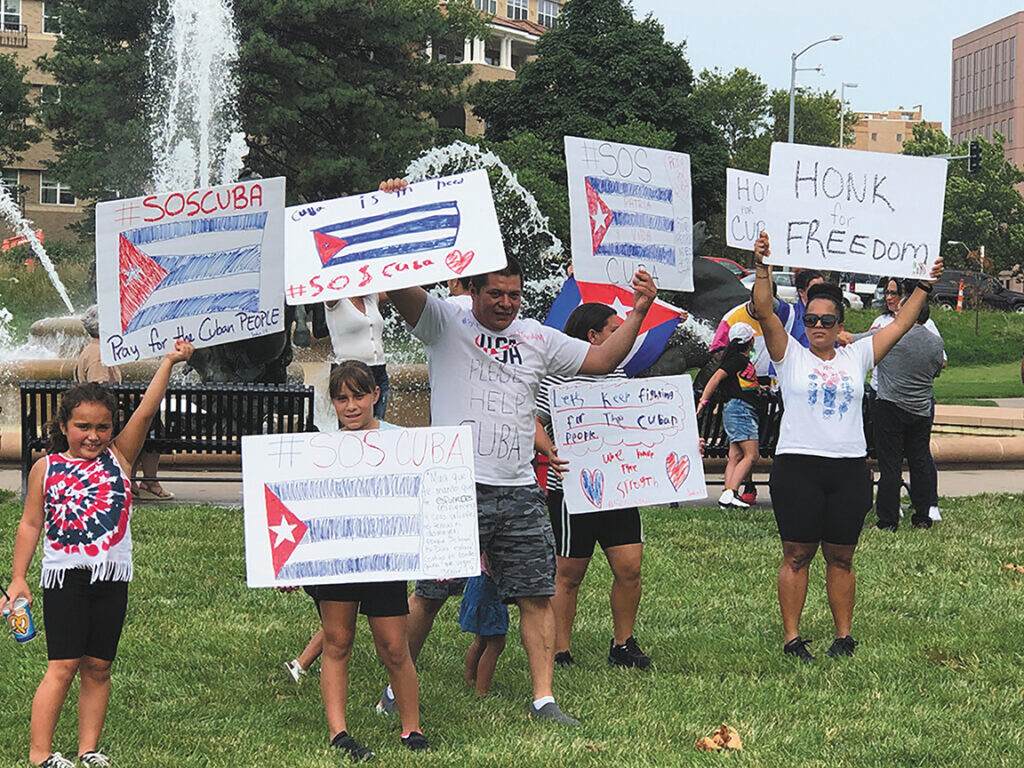
Cuban Unrest
On July 11, thousands of Cubans gathered to protest the government and its treatment of citizens. It resulted in one of the largest anti-government protests the nation has ever witnessed. Cuban Americans in Kansas City protested in solidarity with their relatives, friends and countrymen. Historic Northeast residents Gresia Cabrera and her father Leo Cabrera, pastor of Jesus Cristo El Buen Pastor, 4925 St John Ave., knew their pain. When Gresia was six years old, her father was sentenced to eight years in prison on accusations of rebelling against the Cuban government while preaching. As a political prisoner, Leo spent four years behind bars before Pope John Paul II interceded in 1998. Although he was released from prison, the Communist government in Cuba exiled the Cabrera patriarch, forcing him to start a new life in the United States. “The country practically kicked us out, but the U.S. opened their doors for us,” Leo said. “They’re two complete opposites. Ninety miles south from the coast of Miami is one of the worst dictatorships in our history.”
Gresia and her father wish to, one day, return to their homeland without fear of government oppression. For now, all they can do is push for a better Cuba from Kansas City.
“I love that land, I love my people,” Leo said. “They exiled me and I cannot go back because they will make me disappear. It’s my heart’s desire to go back to my land.”
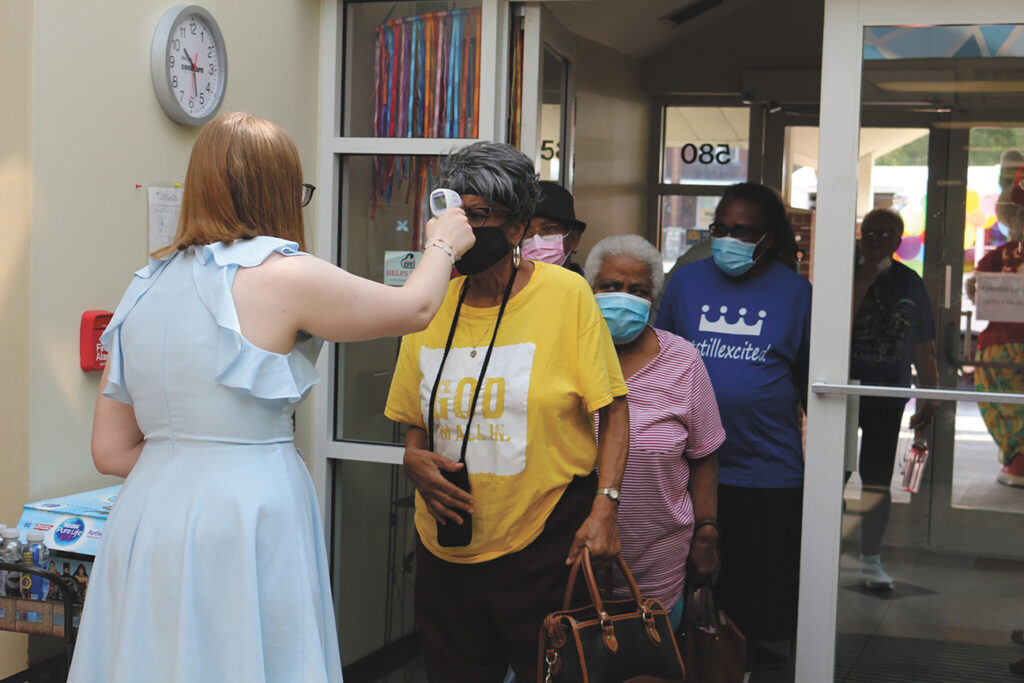
Senior Center Reopens
After more than a year of empty calendars, phone calls to check on friends, and quiet hallways, Kansas City’s seniors re-emerged to gather at Don Bosco Senior Center on July 20.
The center, located at 526 Campbell St. in Columbus Park, is a home away from home for many of the Northeast’s elderly residents and adults with disabilities, somewhere they can socialize, get connected with services, and stay active.
Director of Development Ann Van Zee remembers the last day the center was open for meals and activities – Friday, March 13, 2020.
Leading up to the reopening, Van Zee overheard many phone conversations as staff explained the requirements for returning, how transportation would work, and what to expect. She recognized the excitement and relief in their voices that they could return.
“Just the excitement in their voices and that, ‘Oh gosh, I can see my friends! I can come to Don Bosco, I have some place to go, something to do,’ and hopefully get back to a little bit of somewhat normality,” Van Zee said.
Throughout the pandemic, Don Bosco staff was hard at work providing services, hosting a monthly fresh food drive with Harvesters, and delivering Meals on Wheels.
“When we closed due to COVID under the pandemic restrictions, many of our congregate diners – those that normally come here, some of them every weekday, for a hot meal – they were able to receive the Meals on Wheels home delivery if they fell within our delivery area, which most of them do, but we have people who come from all over,” Van Zee said.
They also continued to deliver to about 150 to 180 home-bound individuals who didn’t come to the center but needed meals. They were averaging 400 to 450 meal deliveries every single day of the pandemic.
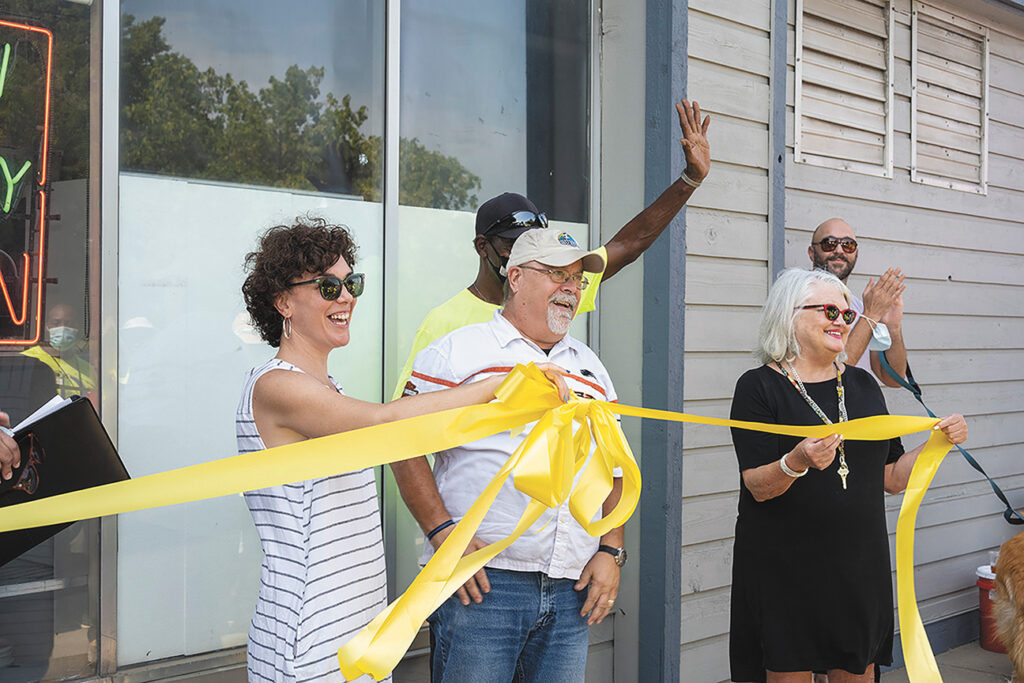
Boulevard Bakery Closes
The end of an era, the neon “open” sign at Boulevard Bakery & Pastries flickered off for the last time on Saturday. After nearly 30 years, the owners hung up their aprons in anticipation of a well-deserved retirement.
On Thursday, Aug. 12, the Northeast Kansas City Chamber of Commerce hosted a “ribbon tying” event at Boulevard Bakery to honor their business. Regulars turned out to thank the bakery for years of sweet treats, reminiscing on early morning donut runs and special occasions as they stood in line hoping their favorites weren’t already gone.
A proclamation from State Rep. Ingrid Burnett (D-23), read by Northeast Kansas City Historical Society President Kent Dicus, recognized the business’s owners Mary Clark and Loretta Peeler and employees Roni Scott and Brian Szafranski for their contributions to the neighborhood.
“Thank you so much for supporting us through the years,” Szafranski said. “It wouldn’t be there without you guys, it’s really been a great ride, and thank you all so much.”
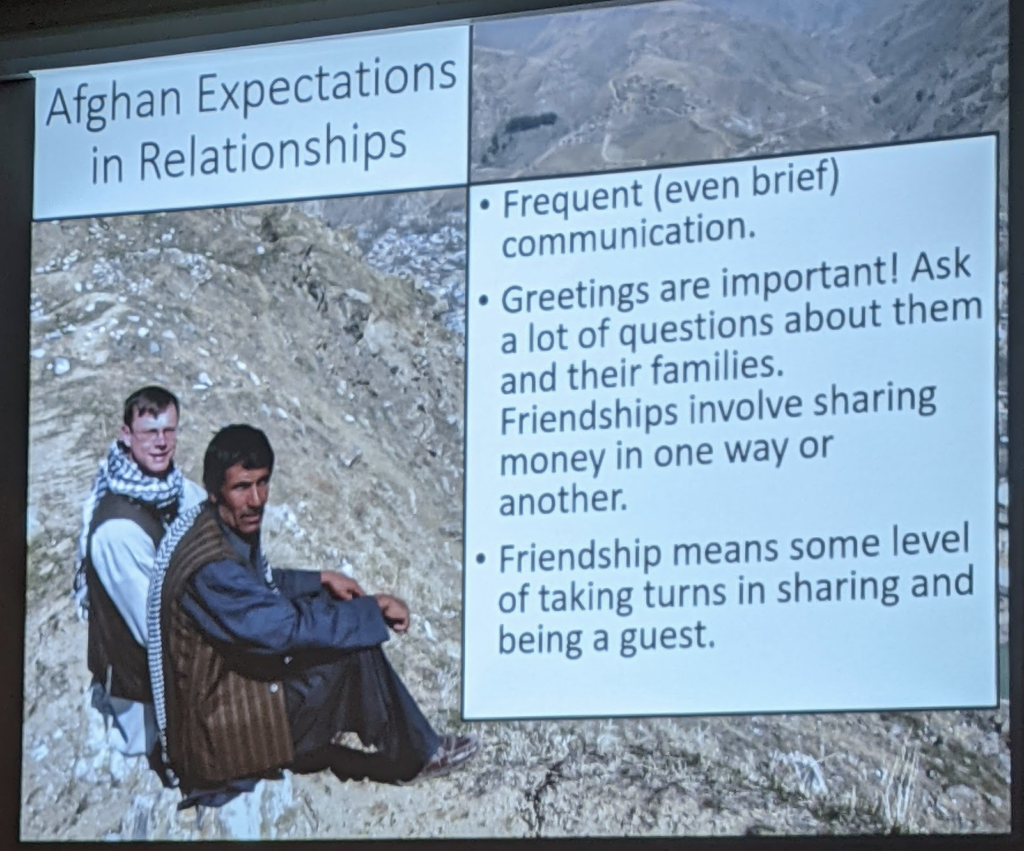
Afghan Refugees
Della Lamb Community Services at 500 Woodland Ave. prepared to ramp up their resources, staffing and volunteers as the U.S. completed its withdrawal from Afghanistan on August 30.
“Much of refugee resettlement – not just with Afghan evacuees, but for those who have been displaced – much of the resettlement system is based upon this concept of relationship,” said Della Lamb’s Executive Director Ryan Hudnall.
Residents of the U.S. can even submit paperwork, an affidavit of relationship, for someone who has been displaced to increase their likelihood of being resettled in a specific destination.
“You want a community of support to help someone navigate all the questions with coming to a new place, having a new language, understanding new laws, so it makes sense to go to a place where you have a natural community of support,” Hudnall said.
Jack Markell, White House Coordinator for Operation Allies Welcome joined local agencies and school leaders to discuss Afghan resettlement efforts on Thursday, Dec. 2. Markell visited with community stakeholders, newly-arrived and resettled Afghan families, service providers and community leaders throughout the day in Historic Northeast Kansas City, ending the day at KCPS’ International Welcome Center. As Afghan evacuees relocate across the U.S., local resettlement agencies are providing support at an unprecedented rate. Kansas City resettlement agencies are expecting to resettle about 625 Afghans through January and have already welcomed more than 325 to the area.
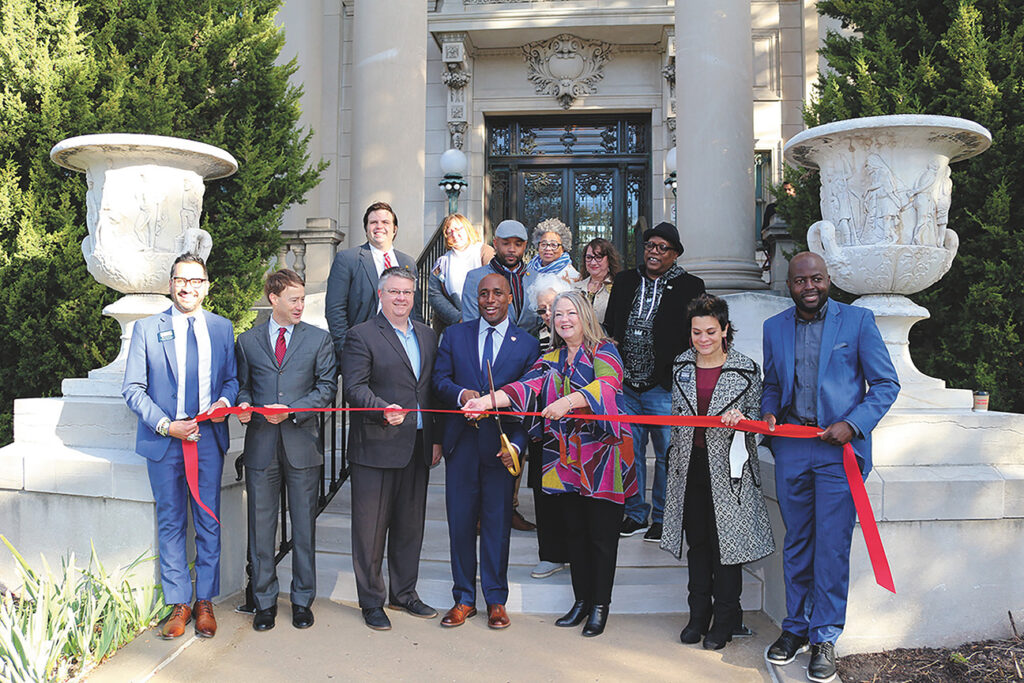
Kansas City Museum Reopens
The Kansas City Museum is once again open to visitors as the new museum of Kansas City history and cultural heritage, following a $22 million restoration and renovation.
The historic Corinthian Hall, built in 1910 by lumber baron Robert A. Long at 3218 Gladstone Blvd., has been closed since 2017. The 70-room mansion itself is an artifact, built in the Beaux-Arts style, and has been home to the Museum since its initial opening to the public in 1940.
Public funding for Stage I of Corinthian Hall Construction was provided by the Museum Mill Levy, and $8 million in GO KC Bonds, as approved by voters on April 4, 2017. Additionally, the Kansas City Museum Foundation, which took control of museum operations in May of this year, raised private funds through the Making A Museum KC campaign to create the history- and humanities-based exhibitions for Corinthian Hall.
Anticipation has been building throughout the past year for the grand reopening of Historic Northeast Kansas City’s crown jewel as neighbors, stakeholders, supporters and history lovers have gotten sneak peeks of the progress at recent events like the museum’s annual Derby Party, and a preview tour for Northeast residents.
“I hope that people walk away with a couple of things – number one, learning something about Kansas City history that they didn’t know before,” Tutera said. “Feeling represented, that their race, ethnicity, culture and community is represented in this experience – and if it isn’t, that they come and talk to us so that we can work on that together – and that people feel inspired to be more engaged citizens in Kansas City.”

Houseless Community
The City, area social service agencies and neighborhoods have been attempting to solve the growing homelessness crisis in Kansas City, and specifically in Northeast Kansas City, throughout 2021.
From January to March 2021, the City opened Bartle Hall Convention Center as a warming center, sheltering up to 500 people per night, serving 28,000 meals, and connecting homeless individuals with 15 partner agencies for social services.
Residents and city leaders participated in the three-day Northeast Kansas City Housing Summit, hosted by the Greater Kansas City Coalition to End Homelessness (GKCCEH), in March. The summit facilitated discussion towards creating sustainable solutions through collaborative efforts to provide housing for those in need.
The City then pivoted to housing people in hotels from April through July, while attempting to connect them with services.
In April, after multiple trips back to the drawing board, Kansas City’s first small shelter community for the unhoused was introduced. Merging KC, led by Houston DeFoe, headed up the project that planned to bring together resources from across the city, including local government, to provide meaningful transitional housing to Kansas City’s homeless population. The project was ultimately stalled.
As cold weather approached once again, the Housing and Community Development Department updated the City Council about plans for helping Kansas City’s houseless community this winter at the Business Session on October 28 at City Hall. The department estimates that Kansas City has anywhere from 1,700 to 2,000 unhoused people living in parks, under bridges, on private land, in right of ways, and in a number of shelters. While their estimates are conservative, they expect to see an increase in 2023. One focus will be enhanced collaboration with existing shelters to pinpoint available beds and ensure that service providers fully utilize resources, including creation of a new online dashboard that updates bed availability daily, with data sharing across all service providers. They will focus on preparing overflow space, such as community centers, as needed when extreme weather or other emergencies increase the demand for services when shelters are full. Last year, places like the Garrison Community Center in Columbus Park were utilized.
On November 19, the City’s Public Works Department swept a tent camp on the southwest corner of Independence and Paseo on the former site of the Royale Inn following numerous citizen complaints regarding criminal activity at the camp over the last month. Additionally, neighboring businesses and community organizations had expressed concern for the safety of their customers and employees. This came on the heels of a recent machete fight at Windsor Avenue and Gladstone Blvd. between two homeless men. The victim in that conflict was transported to an area hospital with non life threatening injuries. The suspect still remains at large.
In Northeast, Hope Faith Homeless Assistance Campus at 705 Virginia Ave. is preparing for winter in Kansas City as rates of homeless continue to rise and funding remains tight for the already understaffed agency. In November, Hope Faith withdrew its initial plan submitted in response to the City’s Request for Proposals (RFP) for a winter preparedness plan for the unhoused. Jaysen Van Sickle, Executive Director of Hope Faith, said the offer from the City wasn’t enough to expand services successfully – adding caseworkers, long-term support structures and financial assistance – for all Hope Faith’s clients.
The City Council approved a plan to lift the most vulnerable of Kansas City’s unhoused population off the streets and into a more permanent housing solution in mid-December. The council is allocating $400,000 to create a Housing Navigation Center (Lotus Care House) by converting the former Days Inn at 5100 E. Linwood Blvd. into single-room transitional housing units. A full suite of wrap around services such as health care, housing placement assistance and social workers, will be available for everyone living at the Housing Navigation Center. The long-term focus will be to transition individuals and families into permanent housing, although residents at this location will be able to stay as long as needed. Operated by service-provider partner Lotus Care, the navigation center features 39 rooms for supportive housing for houseless individuals and families, with special emphasis on seniors 55 and older, single women, medically fragile adults and the LGBTQ+ houseless community.
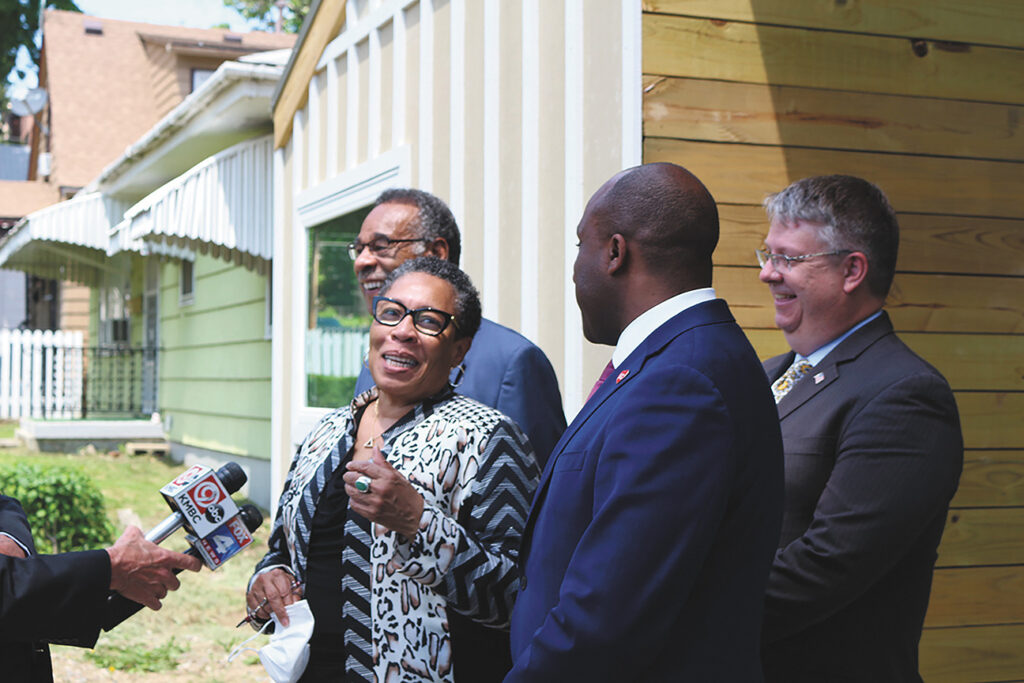
Mattie Rhodes builds sustainable home
Housing and Urban Development (HUD) Secretary Marcia Fudge visited Mattie Rhodes Center’s (MRC) first net zero house project, followed by a roundtable discussion with CoBuild and MRC staff, as part of her tour of Kansas City on Wednesday, May 26 to highlight the American Jobs Plan.
Joined by U.S. Congressman Emanuel Cleaver II (D-MO), Northeast Alliance Together (NEAT) Director Scott Wagner, and Kansas City Mayor Quinton Lucas, Fudge toured the property and discussed sustainable low income housing.
Earlier in the day, Fudge gave remarks on the Biden Administration’s proposal to use $35 billion in HUD’s Home Investment Partnership program and another $45 billion in addressing housing needs across the country.
The center has been serving the community for over 100 years and has recently shifted its focus to include job training and affordable housing, MRC President and CEO John Fierro said.
MRC hopes to tackle the next round of infill houses on long vacant lots just two blocks away from the site on North Topping Ave., near its Northeast location. They are contemplating economies of scale and sustainability, while also being cognizant of the current residents of the neighborhood and not pricing them out.
Partners broke ground on the project last August, just down the street from Mattie Rhodes’ Northeast location, in a diverse, tight-knit neighborhood threatened by a shortage of quality, safe and affordable housing.
The design was developed in collaboration with Kansas State University (K-State) and CoBuild, led by Tate Williams, a Pendleton Heights resident and local contractor focused on affordable housing.
The home was listed for $125,000, and with a 30-year mortgage, the new homeowner would pay about $600 per month, less than market rate rent of a comparable size unit in the neighborhood – if one can find any, Williams said.
“For less than rent, someone can own and be building equity in a home,” Williams said. “ Now, that’s a 30 year note – a lot of people might not believe that’s how a home should be sold – but that’s the most common tool for homeownership.
















